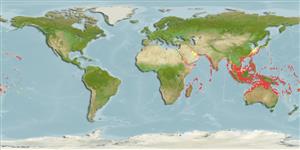Common names from other countries
>
Eupercaria/misc (Various families in series Eupercaria) >
Lutjanidae (Snappers) > Lutjaninae
Etymology: Macolor: Latin, macula, -ae = stain, spot.
More on author: Forsskål.
Environment: milieu / climate zone / depth range / distribution range
экология
морской ассоциированный с рифами; пределы глубины 2 - 90 m (Ref. 9821). Tropical; 36°N - 30°S, 31°E - 153°W (Ref. 55)
Indo-Pacific: East Africa to Samoa, north to central Japan, south to Australia.
Size / Вес / Возраст
Maturity: Lm ? range ? - ? cm
Max length : 75.0 cm TL самец/пол неопределен; (Ref. 5484); common length : 35.0 cm TL самец/пол неопределен; (Ref. 30573)
колючие лучи спинного плавника (общее число) : 10; членистые (мягкие) лучи спинного плавника (общее число) : 13 - 15; колючие лучи анального плавника: 3; членистые (мягкие) лучи анального плавника: 10 - 11. This species is distinguished by the following characters: body relatively deep and laterally compressed, greatest body depth 2.2-2.4 in SL; dorsal profile of head convex in adults, in oblique straight line in young; maxilla without scales or longitudinal ridges; preopercle with a deep notch (or gash) receiving elongate interopercular spine (none for individuals less than 16 cm SL); gill rakers of first gill arch 26-38 + 60-71 = 89-107; soft rays of dorsal fin usually 14, in anal fin 11, in pectoral fin 17; continuous dorsal fin with spinous portion distinctly notched in young; dorsal and anal fins distinctly pointed posteriorly, the soft ray of both fins, shorter than next to last ray; caudal fin rounded with middle rays elongated in small juveniles, slightly notched at intermediate sizes and emarginate in adults; pelvic fins short and rounded for all sizes; soft dorsal and anal fins with scales basally; tubed lateral-line scales 50-55; juveniles with very long pelvic fins. Colour of adults silvery grey, strongly blotched with blackish patches, lacks yellow on head and body and without blue markings on head and body, much duller iris; juveniles with black and white pattern but broader white area encompassing posterior head and adjacent body and with less than 5 white spots on back (Ref 9821, 90102).
Adults are found on steep outer walls of lagoon, channel and seaward slopes in large schools (Ref. 9710, 48635). Juveniles are solitary (Ref. 30573). Feeds largely on fishes and crustaceans Caught with handlines, gill nets, and traps, but also speared by divers and are frequently seen in markets and sold mainly fresh (Ref. 9821).
Life cycle and mating behavior
Maturities | размножение | Spawnings | Egg(s) | Fecundities | личинки
Allen, G.R., 1985. FAO Species Catalogue. Vol. 6. Snappers of the world. An annotated and illustrated catalogue of lutjanid species known to date. FAO Fish. Synop. 125(6):208 p. Rome: FAO. (Ref. 55)
Статус Красного Списка МСОП (Ref. 130435)
CITES (Ref. 128078)
Not Evaluated
Угроза для людей
Harmless
Использование человеком
рыболовство: коммерческий; объект спортивного рыболовства: да; аквариум: коммерческий
дополнительная информация
инструменты
Специальные отчеты
Скачать в формате XML
ресурсы в Интернет
Estimates based on models
Preferred temperature (Ref.
115969): 24.7 - 29.1, mean 28.1 (based on 1828 cells).
Phylogenetic diversity index (Ref.
82804): PD
50 = 0.7500 [Uniqueness, from 0.5 = low to 2.0 = high].
Bayesian length-weight: a=0.01585 (0.00978 - 0.02569), b=2.99 (2.86 - 3.12), in cm Total Length, based on LWR estimates for this species & (Sub)family-body (Ref.
93245).
Trophic level (Ref.
69278): 4.0 ±0.66 se; based on food items.
устойчивость к внешним воздействиям (Ref.
120179): низкий, минимальное время удвоения популяции 4.5-14 лет (Preliminary K or Fecundity.).
Fishing Vulnerability (Ref.
59153): Moderate to high vulnerability (50 of 100).
